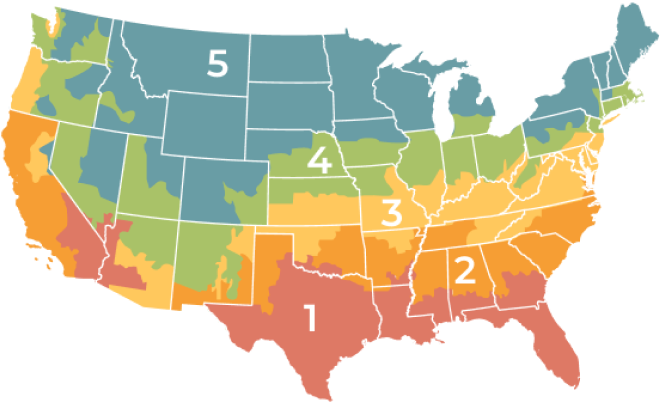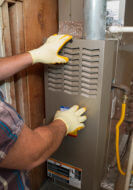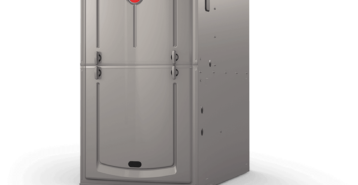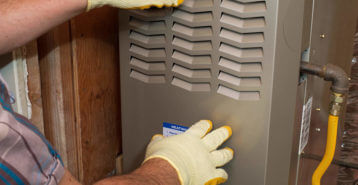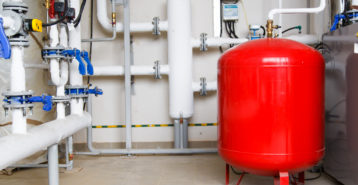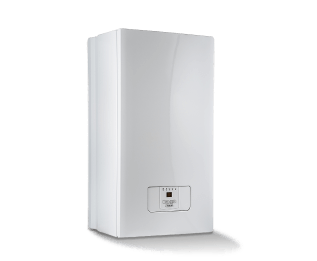Choosing the Right Furnace Size
If your furnace is too small for your home, it will have to work overtime to keep up—driving up your utility bills and wearing out faster than it should. That’s why choosing the right furnace size is so important. Our furnace size calculator makes it easy to estimate how many BTUs you’ll need based on your home’s location, square footage, and the age of your windows and insulation. Here’s what to know before you shop.
Furnace Size Calculator
Ready to find what size furnace you need? At the top of the page, you’ll find our furnace size calculator. There, you can answer three quick questions, and we will give you a low to high range of how many BTUs your home will need.
If you don’t know the square footage of your home, multiply the length and width of each room that you wish to heat. Add the measurements for each room together and you will come up with the square footage of your house. Then, use the furnace cost calculator above to find what size furnace you need.
What Size Furnace Does a 2,000 Sq. Ft. Home Need?
Let’s start with the basics. For a 2,000 Sq. ft. home, you will need to install a 60,000 – 80,000 BTU furnace.
Why? The calculation is simple. A basic rule of thumb for furnace size calculation is that it takes 30 BTUs for every square foot of house. So, if you have a 1,000 square foot house, you need a furnace that has a 30,000 BTU output.
However, there are a few other things to take into consideration before you apply this formula to your own home.
The BTU output you need may differ based on which climate zone you live in. If you live in a colder region, you need more BTU per square foot to heat your home compared to homes in warmer regions.
Our furnace size calculator takes these factors into account along with whatever existing windows and home insulation you may have.
What Is BTU for Furnaces?
BTU stands for British Thermal Unit. It is a measurement that determines the thermal energy output of various devices. To put it more scientifically, BTU measures the energy it takes to warm one pound of water by one degree Fahrenheit.
More simply, it represents your furnace’s capacity for how much energy it will take to warm your home.
For this post, we will apply BTUs to home furnaces, but be aware BTUs can also be used to determine the energy it will take to cool your home.
Why Does Furnace Size Matter?
A smaller furnace size than what you need will give you uneven heating and require more energy to maintain optimal temperatures in your home. This will result in higher energy bills.
A bigger furnace size than what you need will lead to overheating areas of your home and yield more power than necessary for your home size. It will also damage the heat exchanger in the furnace because the unit will more frequently turn on and off again as it reaches the set temperatures in your thermostat. See how a furnace works.
Both of these scenarios will ultimately wear on the furnace and shorten its lifespan.
For a general idea on gas furnace size for homes, see the table below:
| Home Size | Furnace BTU | Central AC Unit Size |
|---|---|---|
| 1,200 sq. ft | 50,000 BTU | 1.5 to 2 tons |
| 1,200 to 1,500 sq. ft | 55,000 BTU | 2 tons |
| 1,500 to 1,800 sq. ft | 60,000 BTU | 2.5 tons |
| 1,800 to 2,500 sq. ft | 70,000 BTU | 2.5 to 3 tons |
| 2,500 to 3,500 sq. ft | 90,000 to 100,000 BTU | 3.5 to 4 tons |
Factors To Consider When Choosing The Right Size Furnace For Your Home
Your Home’s Age
Typically, older homes are less energy efficient and may require more BTUs to stay warm. This may not apply to you if you have significantly remodeled not only the portion of the home you can see, but also elements you cannot see, like insulation. Keep reading to learn more about the areas of your home that can help reduce what size furnace you need.
Quality of Insulation
Similarly, if your home has poor insulation you may need a larger furnace. Why? Well, insulation plays an important role in keeping the conditioned/heated air in your home from transferring through the walls and outside. Similarly, it helps keep the outside temperatures from transferring into your home.
Quality and Number of Windows
If you have old windows, the window frames may be drafty and allow heat to escape. Newer windows will have better insulation. Windows facing the south will also passively heat your home, as they allow for sunlight to enter the home and retain the warmth.
Your Home’s Location
The energy your furnace requires definitely depends on where you live in the United States. If you live in Minnesota, you’ll want a furnace with a higher BTU output than someone in Louisiana. If you live in a cold climate, you may want to use a BTU of about 80 instead of 30 to calculate your furnace needs in the formula you read about above.
The Furnace’s Energy-Efficiency Rating
Newer furnaces will have a tag that shows their energy efficiency ranking. It’s best to choose a furnace with the highest ranking within your price point. Even if your home is not especially energy efficient, having an efficient furnace will keep your bills as low as possible while you stay warm.
Will I Need a Furnace Contractor?
A trusted HVAC contractor will know about the latest energy-efficient furnaces on the market. They can also determine if your furnace needs to be repaired or replaced completely.
Working with an HVAC contractor will also help to guarantee you get the best furnace for you and your family’s needs. In addition to making sure it is properly installed, a contractor will present a few furnace options and explain the pros and cons of each type.
If you’ve never replaced a furnace before, consult with an HVAC contractor before you undertake a furnace replacement project. They can help show you what to do as well as suggest basic maintenance tips for prolonging your furnace’s life.
Compare top-rated HVAC pros in your area.
Read real homeowner reviews, explore qualifications, and view promotions. Modernize makes it easy to browse professionals and find one that will be perfect for your project.
